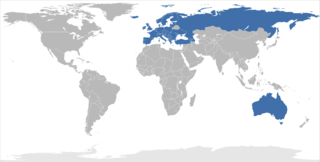Related Research Articles
In contract law, an indemnity is a contractual obligation of one party to compensate the loss incurred by another party due to the relevant acts of the indemnitor or any other party. The duty to indemnify is usually, but not always, coextensive with the contractual duty to "hold harmless" or "save harmless". In contrast, a "guarantee" is an obligation of one party to another party to perform the promise of a relevant other party if that other party defaults.
Delict is a term in civil and mixed law jurisdictions whose exact meaning varies from jurisdiction to jurisdiction but is always centered on the notion of wrongful conduct.
A peremptory norm is a fundamental principle of international law that is accepted by the international community of states as a norm from which no derogation is permitted.
Customary international law is an aspect of international law involving the principle of custom. Along with general principles of law and treaties, custom is considered by the International Court of Justice, jurists, the United Nations, and its member states to be among the primary sources of international law.

Wiedergutmachung after World War II refers to the reparations that the German government agreed to pay in 1953 to the direct survivors of the Holocaust, and to those who were made to work at forced labour camps or who otherwise became victims of the Nazis. The sum would amount, through the years, to over 100 billion Deutsche Mark. Historian Tony Judt writes about Wiedergutmachung:
In making this agreement Konrad Adenauer ran some domestic political risk: in December 1951, just 5 percent of West Germans surveyed admitted feeling ‘guilty’ towards Jews. A further 29 percent acknowledged that Germany owed some restitution to the Jewish people. The rest were divided between those who thought that only people ‘who really committed something’ were responsible and should pay, and those who thought ‘that the Jews themselves were partly responsible for what happened to them during the Third Reich.’ When the restitution agreement was debated in the Bundestag on March 18th 1953, the Communists voted against, the Free Democrats abstained and both the Christian Social Union and Adenauer’s own CDU were divided, with many voting against any Wiedergutmachung (reparations).
In legal terminology, erga omnes rights or obligations are owed toward all. Erga omnes is a Latin phrase which means "towards all" or "towards everyone". For instance, a property right is an erga omnes entitlement and therefore enforceable against anybody infringing that right.

International criminal law (ICL) is a body of public international law designed to prohibit certain categories of conduct commonly viewed as serious atrocities and to make perpetrators of such conduct criminally accountable for their perpetration. The core crimes under international law are genocide, war crimes, crimes against humanity, and the crime of aggression.
The laws of state responsibility are the principles governing when and how a state is held responsible for a breach of an international obligation. Rather than set forth any particular obligations, the rules of state responsibility determine, in general, when an obligation has been breached and the legal consequences of that violation. In this way they are "secondary" rules that address basic issues of responsibility and remedies available for breach of "primary" or substantive rules of international law, such as with respect to the use of armed force. Because of this generality, the rules can be studied independently of the primary rules of obligation. They establish (1) the conditions of actions to qualify as internationally wrongful, (2) the circumstances under which actions of officials, private individuals and other entities may be attributed to the state, (3) general defences to liability and (4) the consequences of liability.
The Algiers Accords of January 19, 1981 was a set of obligations and commitments undertaken independently by the United States and Iran to resolve the Iran hostage crisis, brokered by the Algerian government and signed in Algiers on January 19, 1981. The crisis began from the takeover of the American embassy in Tehran on November 4, 1979, where Iranian students took hostage of present American embassy staff. By this accord and its adherence, 52 American citizens were able to leave Iran. With the two countries unable to settle on mutually agreeable terms, particularly for quantitative financial obligations, Algerian mediators proposed an alternative agreement model - one where each country undertook obligations under the accords independently, rather than requiring both countries to mutually adhere to the same terms under a bilateral agreement.

International asset recovery is any effort by governments to repatriate the proceeds of corruption hidden in foreign jurisdictions. Such assets may include monies in bank accounts, real estate, vehicles, arts and artifacts, and precious metals. As defined under the United Nations Convention against Corruption, asset recovery refers to recovering the proceeds of corruption, rather than broader terms such as asset confiscation or asset forfeiture which refer to recovering the proceeds or instrumentalities of crime in general.
The issue of Armenian genocide reparations derives from the Armenian genocide of 1915 committed by the Ottoman Empire. Such reparations might be of financial, estate or territorial nature, and could cover individual or collective claims as well as those by Armenia. The majority of scholars of international law agree that Turkey is the successor state or continuation of the Ottoman Empire. In addition, the Republic of Turkey continued the Ottoman Empire's internationally wrongful acts against Armenians, such as confiscation of Armenian properties and massacres. Former Secretary of the UN Human Rights Committee, Professor Alfred de Zayas, Geneva School of Diplomacy, stated that "[b]ecause of the continuing character of the crime of genocide in factual and legal terms, the remedy of restitution has not been foreclosed by the passage of time".
Reparations are broadly understood as compensation given for an abuse or injury. The colloquial meaning of reparations has changed substantively over the last century. In the early 1900s, reparations were interstate exchanges that were punitive mechanisms determined by treaty and paid by the surrendering side of a conflict, such as the World War I reparations paid by Germany and its allies. Reparations are now understood as not only war damages but also compensation and other measures provided to victims of severe human rights violations by the parties responsible. The right of the victim of an injury to receive reparations and the duty of the part responsible to provide them has been secured by the United Nations.
After World War II both West Germany and East Germany were obliged to pay war reparations to the Allied governments, according to the Potsdam Conference. Other Axis nations were obliged to pay war reparations according to the Paris Peace Treaties, 1947. Austria was not included in any of these treaties.

Case Concerning Barcelona Traction, Light, and Power Company, Ltd [1970] ICJ 1 is a public international law case, concerning the abuse of rights.

The Council of Europe Convention on Laundering, Search, Seizure and Confiscation of the Proceeds from Crime and on the Financing of Terrorism, also known as the Warsaw Convention or CETS 198, is a Council of Europe convention which aims to facilitate international co-operation and mutual assistance in investigating crime and tracking down, seizing and confiscating the proceeds thereof.

The Convention on Laundering, Search, Seizure and Confiscation of the Proceeds from Crime, also known as the Strasbourg Convention or CETS 141, is a Council of Europe convention which aims to facilitate international co-operation and mutual assistance in investigating crime and tracking down, seizing and confiscating the proceeds thereof. The Convention is intended to assist States in attaining a similar degree of efficiency even in the absence of full legislative harmony.
Following Russia's invasion of Ukraine beginning on 24 February 2022, the United States, the European Union, and other Western countries introduced or significantly expanded sanctions covering Russian President Vladimir Putin, other government members and Russian citizens in general. Some Russian banks were banned from using the SWIFT international payments system. The sanctions and the boycotts of Russia and Belarus impacted the Russian economy.

The unfriendly countries list is a list of countries published by the Russian government that it says "commit unfriendly actions against Russia, Russian companies and citizens". Countries added to the list are subject to certain restrictions related to their relationships with Russia, including trade and currency restrictions and personnel limits in the listed countries' diplomatic missions in Russia.
The proposed International Criminal Tribunal for the Russian Federation is a proposed ad hoc international criminal tribunal aimed at prosecuting the Russian Federation and senior Russian and Belarusian leaders for the Russian invasions of Ukraine as one or more crimes of aggression, as a complement to the existing International Criminal Court investigation in Ukraine. Several international bodies announced their support for its establishment, including the Council of Europe, the European Commission, the NATO Parliamentary Assembly and the European Parliament.

Iryna Romanivna Mudra is a Ukrainian lawyer and banker who has been serving as one of the several Deputy Ministers of Justice under Prime Minister Denys Shmyhal since 27 May 2022. A graduate of the University of Lviv, she was a lawyer at the State Savings Bank of Ukraine before she began working for the state.
References
- 1 2 3 4 5 6 7 8 9 Hathaway, Oona A.; Mills, Maggie; Poston, Thomas M. (2023-11-08). "War Reparations: The Case for Countermeasures". Search eLibrary. Stanford Law Review. p. 7. Retrieved 2023-12-07.
- 1 2 3 "Draft articles on Responsibility of States for Internationally Wrongful Acts, with commentaries" (PDF). 2008. Retrieved 2023-12-07.
- 1 2 Zelikow, Philip (2022-05-12). "A Legal Approach to the Transfer of Russian Assets to Rebuild Ukraine". Lawfare. Retrieved 2023-12-08.
- ↑ AuslÄ, R; Ö, Ndisches; Vö, ffentliches Recht und (2022-09-15). "World Court Digest". Max-Planck-Institut für ausländisches öffentliches Recht und Völkerrecht. Retrieved 2023-12-11.
- ↑ Schachter, Oscar (1994). "Dispute Settlement and Countermeasures in the International Law Commission". The American Journal of International Law. 88 (3). American Society of International Law: 471–477. ISSN 2161-7953. JSTOR 2203714 . Retrieved 2023-12-09.
- 1 2 Bills, Amanda (2020-03-14). "The Relationship between Third-party Countermeasures and the Security Council's Chapter vii Powers: Enforcing Obligations erga omnes in International Law". Nordic Journal of International Law. 89 (1). Brill: 117–141. doi:10.1163/15718107-bja10003. ISSN 0902-7351.
- ↑ Roguski, Przemysław. "Collective Countermeasures in Cyberspace – Lex Lata, Progressive Development or a Bad Idea?" (PDF). Cooperative Cyber Defence Centre of Excellence. Retrieved 2023-12-11.
- 1 2 Wood, Michael C. (2014-05-22). "Second report on identification of customary international law by Michael Wood, Special Rapporteur". UN. Retrieved 2023-12-13.
- ↑ "Customary International Law – International Law". USLegal. Retrieved 2023-12-11.
- ↑ Longobardo, Marco. "The Contribution Of International Humanitarian Law To The Development Of The Law Of International Responsibility Regarding Obligations Erga Omnes And Erga Omnes Partes" (PDF). Retrieved 2023-12-11.
- 1 2 Hook, Kristina; Diamond, Yonah (2023-08-23). "The case for seizing Putin regime assets". Atlantic Council. Retrieved 2023-12-07.
- 1 2 Moiseienko, Anton (July 2022). "TRADING WITH A FRIEND'S ENEMY" (PDF). American Journal of International Law. Cambridge University Press (CUP). p. 727. Archived from the original on 2022-11-05. Retrieved 2023-11-28.
{{cite web}}: CS1 maint: bot: original URL status unknown (link) - ↑ Brunk, Ingrid (Wuerth) (18 February 2023). "Central Bank Immunity, Sanctions, and Sovereign Wealth Funds" (PDF). George Washington University Law Review. p. 31. Retrieved 6 December 2023.
- 1 2 3 4 Brunk, Ingrid (Wuerth) (2023-05-03). "Countermeasures and the Confiscation of Russian Central Bank Assets". Lawfare. Retrieved 2023-12-03.
- ↑ Demarais, Agathe (2023-11-27). "The Unintended Consequences of Seizing Russian Assets". Foreign Policy. Retrieved 2023-11-28.
- ↑ "The Unintended Consequences of Seizing Russian Assets". DNyuz. 2023-11-27. Retrieved 2023-11-28.
- ↑ Moiseienko, Anton (17 April 2023). "The Freezing and Confiscation of Foreign Central Bank Assets: How Far Can Sanctions Go?". SSRN Electronic Journal. Elsevier BV: 40. doi:10.2139/ssrn.4420459. ISSN 1556-5068.
- ↑ Wintour, Patrick (25 May 2023). "UK to keep Kremlin assets frozen until Russia pays compensation to Ukraine". The Guardian. Retrieved 6 December 2023.
- ↑ "Proposals to Seize Russian Assets to Rebuild Ukraine". Brookings. 29 December 2022. Retrieved 6 December 2023.
- ↑ Criddle, Evan (30 March 2022). "Rebuilding Ukraine Will Be Costly. Here's How to Make Putin Pay". POLITICO. Retrieved 2023-12-06.
- ↑ Stephens, Bret (2023-09-19). "How to Make Russia Really Pay for Invading Ukraine". The New York Times. Retrieved 2023-11-26.
- ↑ Strobel, Gabriel (2023-09-17). "Making Putin Pay – RDI". RDI. Retrieved 2023-11-26.
- 1 2 3 Tribe, Laurence H.; Tolentino, Raymond P.; Harris, Kate M.; Erpenbach, Jackson; Lewin, Jeremy (17 September 2023). "The Legal, Practical, and Moral Case For Transferring Russian Sovereign Assets to Ukraine" (PDF). Renew Democracy Initiative. Retrieved 26 November 2023.
- ↑ Thouvenin, Jean-Marc (2022-05-02). "" Garantissons que la Russie paiera la reconstruction de l'Ukraine "" [Let's guarantee that Russia will pay for Ukraine's reconstruction]. Le Monde.fr (in French). Retrieved 2023-12-10.
- ↑ Ziskina, Yuliya M. (14 June 2023). "Multilateral Asset Transfer: A Proposal for Ensuring Reparations for Ukraine" (PDF). New Lines Institute. p. 24. Retrieved 2023-12-06.
- ↑ Moiseienko, Anton (July 2022). "Frozen Russian Assets and the Reconstruction of Ukraine: Legal Options" (PDF). International Lawyers Project. p. 30. Retrieved 2023-11-28.
- ↑ Moiseienko, Anton (2023-01-19). "Sanctions, Confiscation, and the Rule of Law". Groupe d'études géopolitiques. Retrieved 6 December 2023.
- ↑ Kamminga, Menno T. (2023-04-18). "Confiscating Russia's Frozen Central Bank Assets: A Permissible Third-Party Countermeasure?". Netherlands International Law Review. 70 (1). Springer: 1–17. doi: 10.1007/s40802-023-00231-7 . ISSN 1741-6191 . Retrieved 2023-12-03.
- ↑ Bismuth, Régis (2022-05-18). "The New Frontiers of European Sanctions and the Grey Areas of International Law". Groupe d'études géopolitiques. Retrieved 2023-12-08.
- ↑ Pronczuk, Monika; Nelson, Eshe (2023-12-12). "E.U. Moves to Tap Frozen Russian Assets to Help Ukraine". The New York Times. Retrieved 2023-12-12.